s1jobs Recruitment Insights: Expert Advice for Scottish Employers - Business HQ
In partnership with The Herald's Business HQ, s1jobs Recruitment Insights delivers tailored guidance to help Scottish businesses excel in hiring and talent retention. As Scotland’s leading job board, we bring you data-driven trends, expert strategies, and actionable advice to navigate the ever-changing recruitment landscape.
From attracting top talent in competitive industries to understanding workforce trends across Scotland and beyond, our insights empower you to make informed decisions. Trust s1jobs and The Herald, two Scottish icons, to keep your business at the forefront of recruitment success.
Stay connected with Business HQ for the latest in Scottish business and beyond.
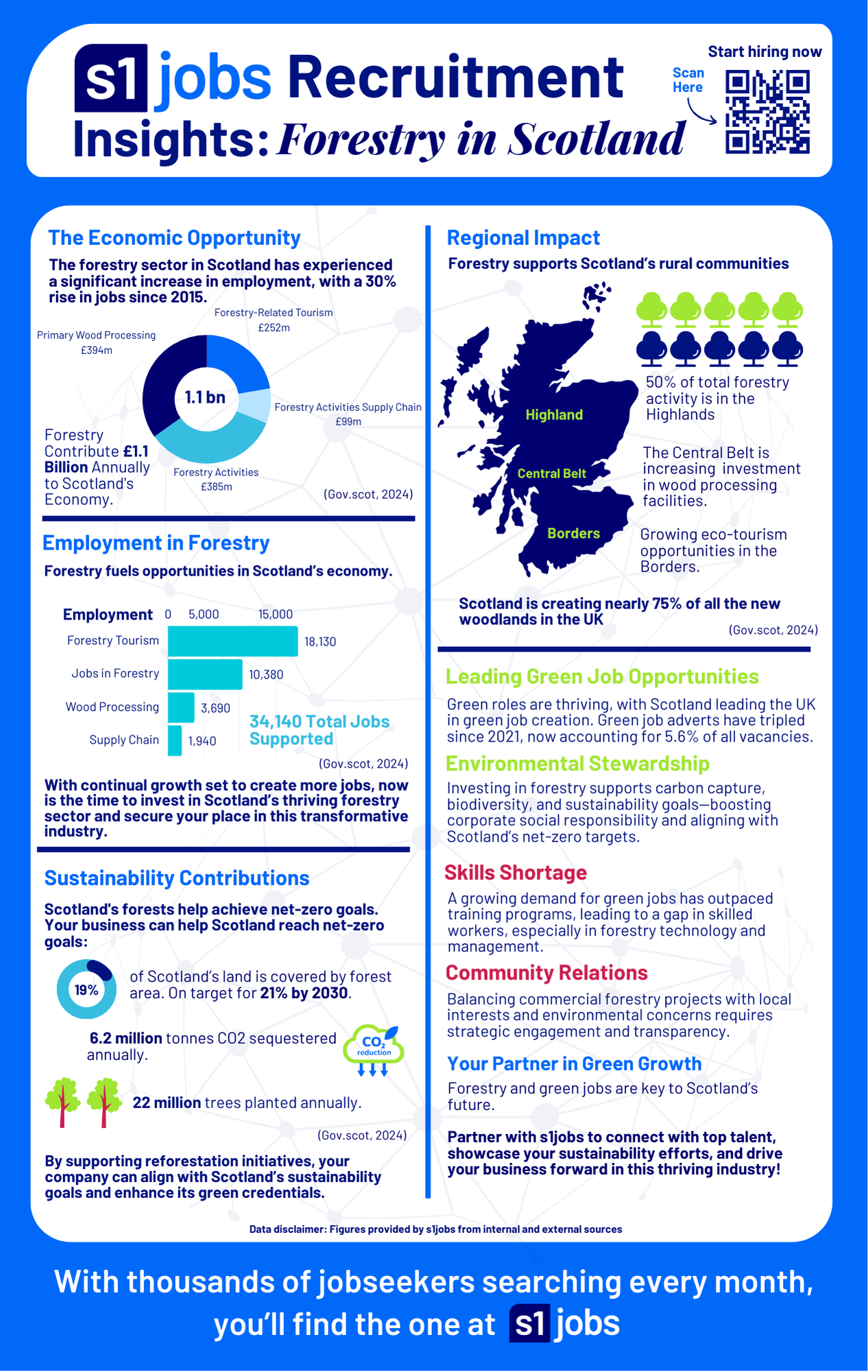
Scotland's Thriving Forestry Sector: A Green Growth Opportunity
Scotland's forestry sector is booming, presenting a wealth of opportunities for businesses, jobseekers, and communities alike. With increasing investment and a strong commitment to sustainability, the industry is poised for further expansion, making it a key player in Scotland’s green economy.
Economic Impact and Job Creation
The forestry sector contributes a staggering £1.1 billion annually to Scotland’s economy, supporting over 34,000 jobs across various roles, from forestry management and wood processing to eco-tourism and supply chain operations. In fact, Scotland accounts for nearly 75% of all new woodlands in the UK, emphasizing its leadership in green job creation.
The sector’s continued growth offers a steady stream of employment opportunities. Currently, key areas include:
- Forestry jobs: 10,380 positions
- Wood processing: 3,690 positions
- Supply chain roles: 1,940 positions
- Forestry-related tourism: 18,130 positions
With green job postings having tripled since 2021, now comprising 5.6% of all vacancies, Scotland is leading the way in sustainable employment.
Regional Growth and Investment
Scotland’s forestry sector is thriving across multiple regions:
- The Highlands account for 50% of total forestry activity.
- The Central Belt is seeing increased investment in wood processing facilities.
- The Borders are experiencing a surge in eco-tourism opportunities.
Businesses looking to invest in the sector can benefit from regional incentives, infrastructure developments, and access to an expanding talent pool.
Sustainability and Environmental Impact
Scotland’s forests are a vital component of the country’s net-zero ambitions. With 6.2 million tonnes of CO2 sequestered annually, the forestry industry plays a crucial role in carbon capture, biodiversity enhancement, and sustainable land management. Additionally, Scotland plants 22 million trees annually, with a target to cover 21% of its land with forests by 2030.
By supporting reforestation initiatives, businesses can align with Scotland’s sustainability goals, enhance their green credentials, and contribute to a healthier environment.
Challenges and Opportunities
Despite the rapid growth, the forestry sector faces challenges, particularly in skills shortages. The demand for expertise in forestry technology, management, and sustainable practices is outpacing training programs, creating a gap in skilled workers. Addressing these shortages through strategic training and recruitment efforts will be critical in sustaining growth.
Moreover, balancing commercial forestry projects with local community interests and environmental considerations requires strategic engagement and transparency to ensure long-term success.
Join the Green Workforce
For jobseekers, the forestry sector presents a future-proof career path with diverse roles, strong job security, and opportunities for skill development. Businesses looking to hire can tap into Scotland’s growing green workforce by partnering with s1jobs, the go-to platform for connecting top talent with employers in this transformative industry.
Whether you're a jobseeker looking for your next opportunity or a company aiming to invest in Scotland’s green economy, now is the time to get involved. The forestry sector isn’t just growing—it’s flourishing.
Recruitment Insights: Should We Trust AI?
In a world where AI is transforming recruitment and workplace practices, the trust and adoption of these technologies are becoming key questions. This infographic from s1jobs explores how employees and decision-makers perceive AI in the workplace, revealing both optimism and reservations.
While 70% of decision-makers support AI as a way to boost productivity and streamline tasks, employees are concerned about its impact on job security and ethical implications. Interestingly, only 42% of employees feel confident their company understands the balance between automation and human intervention.
The data shows that, although AI can enhance productivity (66% agree), many employees feel they lack the skills to fully leverage its capabilities, with 72% needing upskilling in AI. This highlights an opportunity for organizations to invest in training to bridge this skills gap and help their teams embrace new technology confidently.
The future of recruitment may indeed be AI-enhanced, but this data emphasizes that organizations need a balanced, ethical approach to adoption. Building trust in AI means ensuring that it benefits everyone—from employers and recruiters to the employees whose jobs it touches.
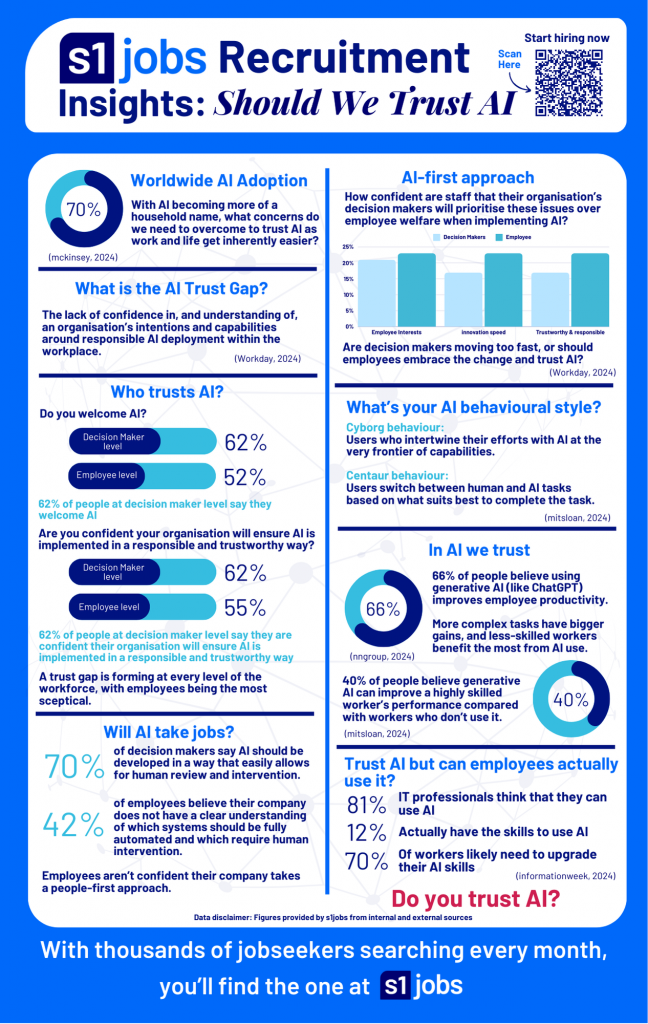
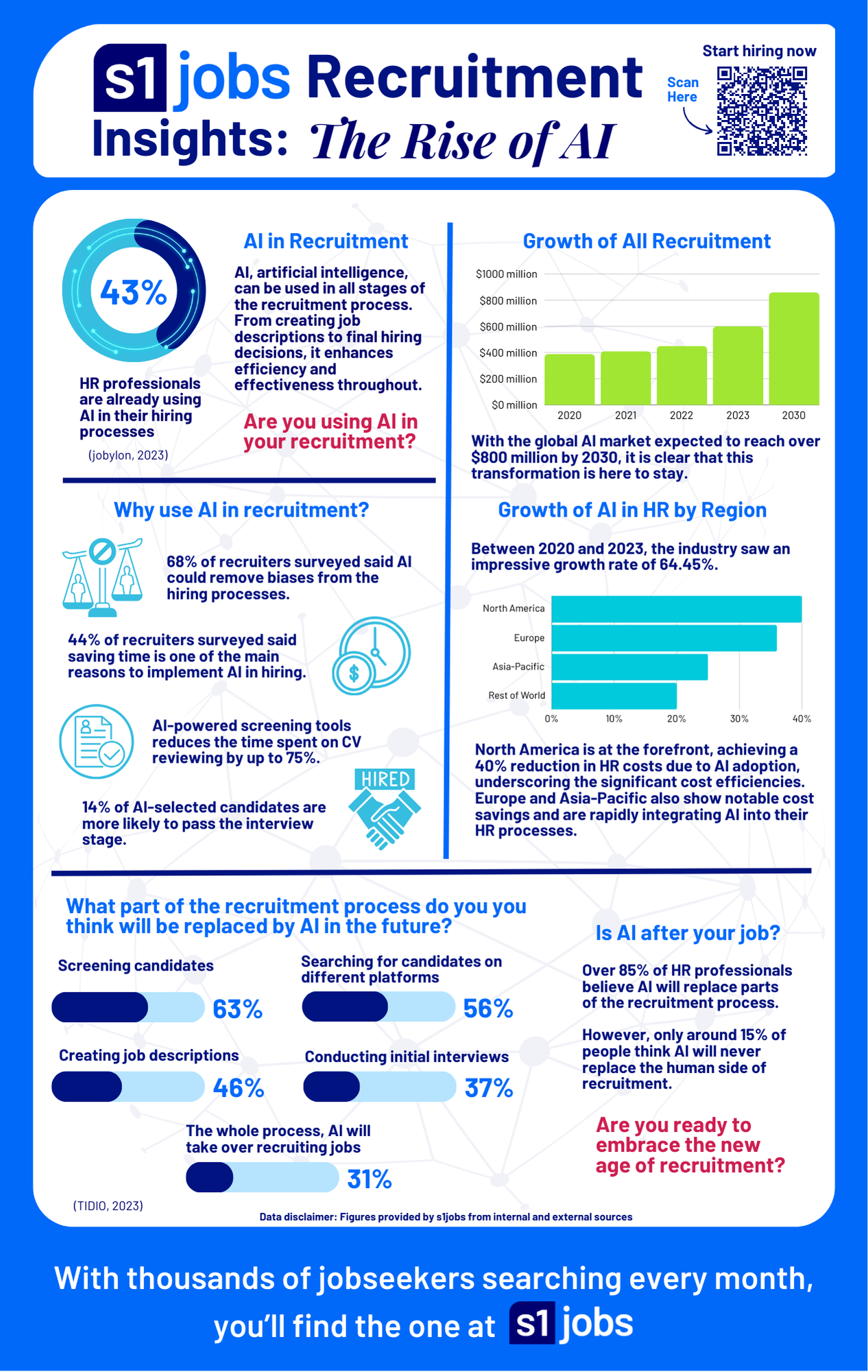
The Rise of AI
AI is revolutionising recruitment, enhancing efficiency and objectivity across the hiring process. This transformation isn’t just a trend—it’s here to stay. With 43% of HR professionals already utilising AI in hiring, it’s clear that tools like AI-powered screening are making a significant impact by reducing CV review time by up to 75%.
Across the globe, the adoption of AI in HR has led to remarkable cost savings, particularly in North America. Europe and Asia-Pacific are following closely, integrating AI to streamline their processes. AI is becoming instrumental in tasks like candidate screening, job description creation, and interview scheduling, making hiring faster and more efficient.
Though over 85% of HR professionals predict AI will replace parts of the recruitment process, there remains a need for the human touch. As recruiters and candidates adapt, the future looks like a collaborative journey, where AI aids rather than replaces human decision-making.
Are you ready to embrace AI and see where it can take your recruitment strategy?
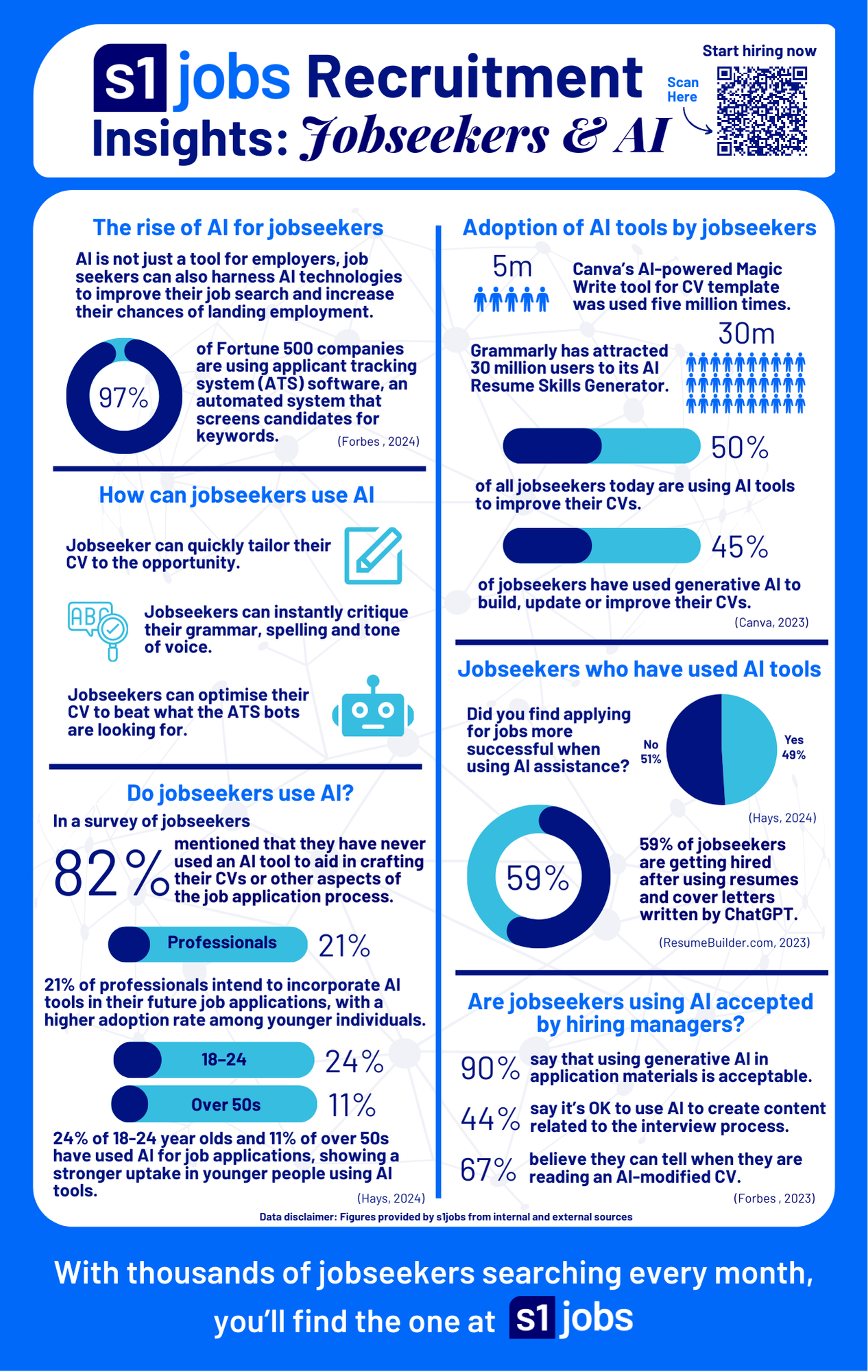
Jobseekers & AI
The rise of AI is transforming how job seekers approach their applications. According to recent data, 97% of Fortune 500 companies now use AI-driven Applicant Tracking Systems (ATS), making it crucial for job seekers to understand and leverage AI to improve their chances. AI tools allow applicants to fine-tune their CVs, optimize keyword relevance, and enhance their grammar and tone.
Interestingly, while 50% of job seekers are already using AI to improve their CVs, a notable 82% have never tried AI in their job applications, especially older candidates. Younger candidates, particularly aged 18-24, are leading adoption, with 24% using AI in their job search compared to 11% of over-50s. However, many professionals are now looking to integrate these tools.
The data also shows that AI-generated application materials are generally accepted by hiring managers, with 90% considering generative AI content acceptable and 59% of job seekers reportedly benefiting from AI-assisted applications. Job seekers should consider AI a powerful ally to help them stand out in a competitive job market.
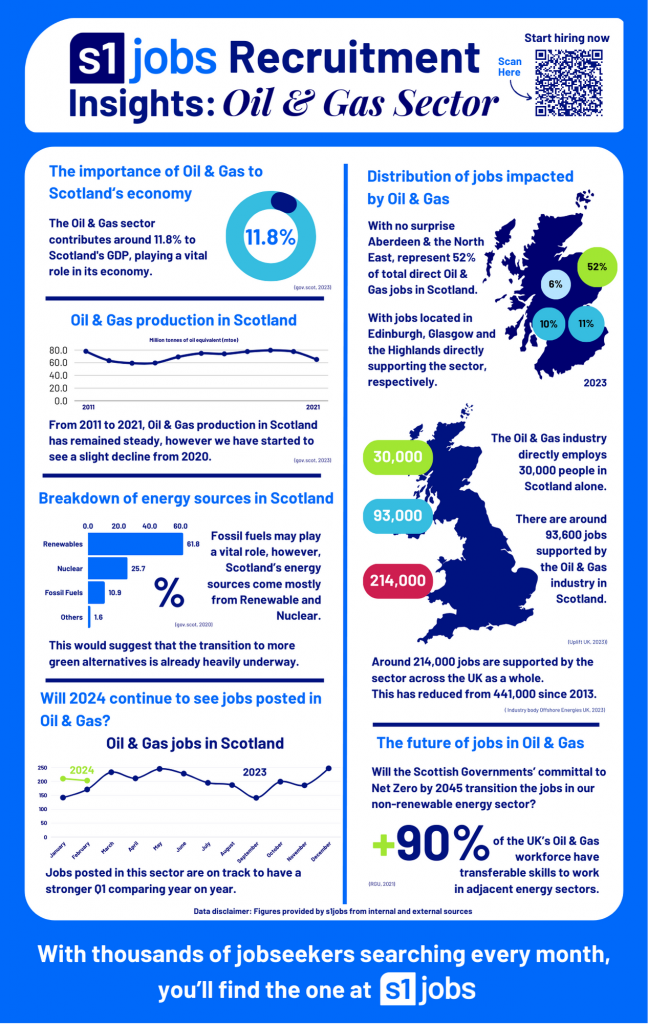
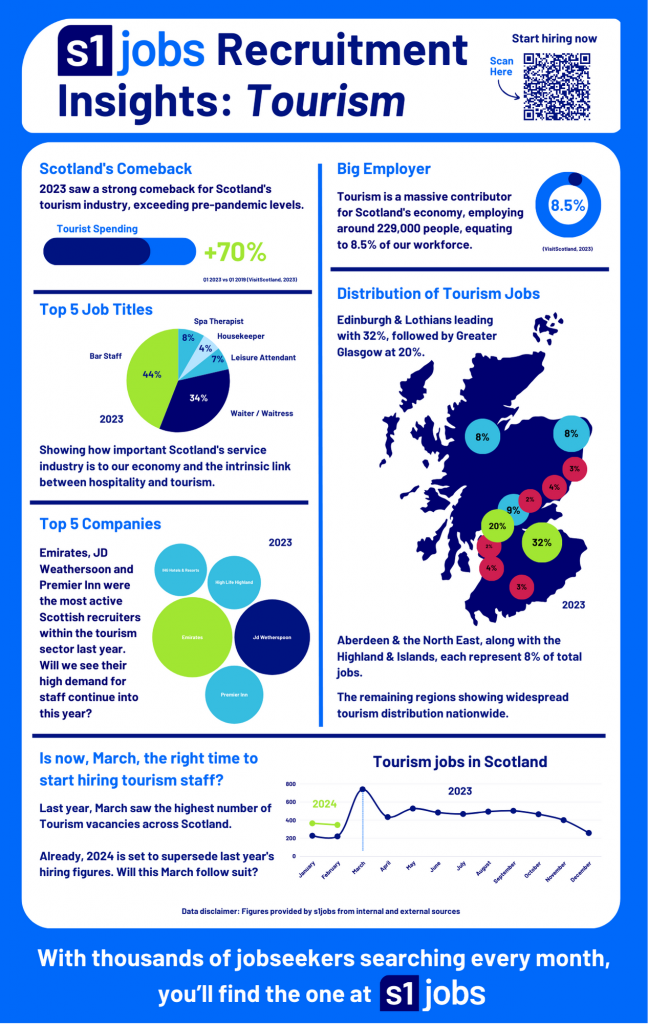
Read more about Scottish businesses and markets online now!
Looking to hire? Find out more and advertise your jobs on s1jobs.

